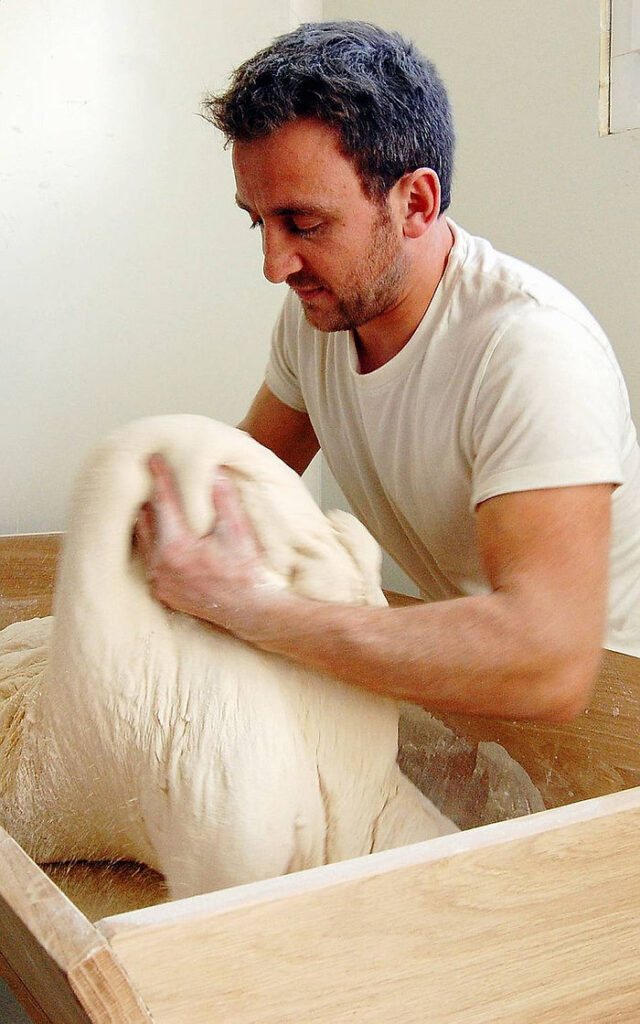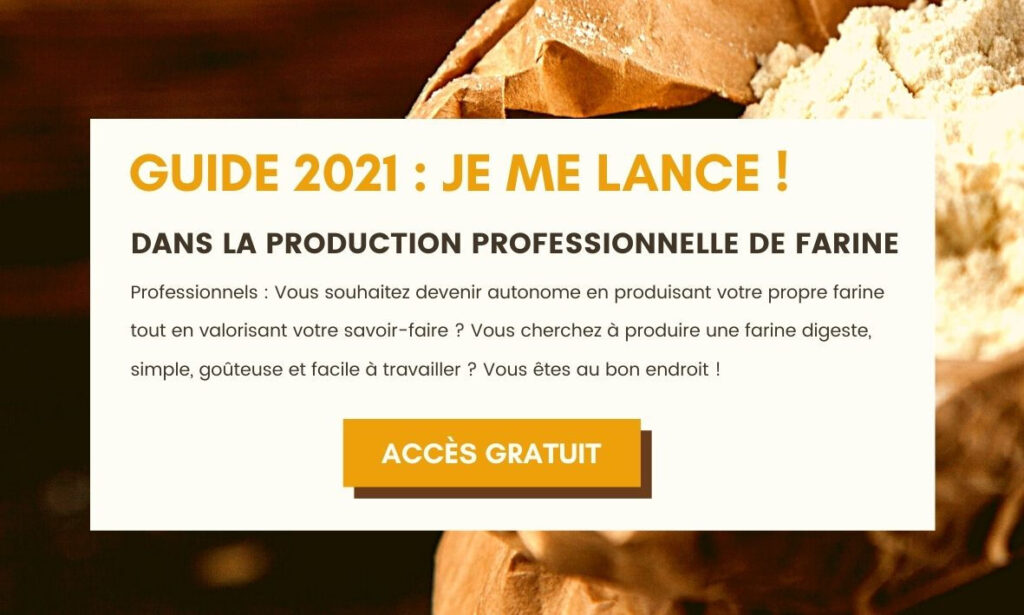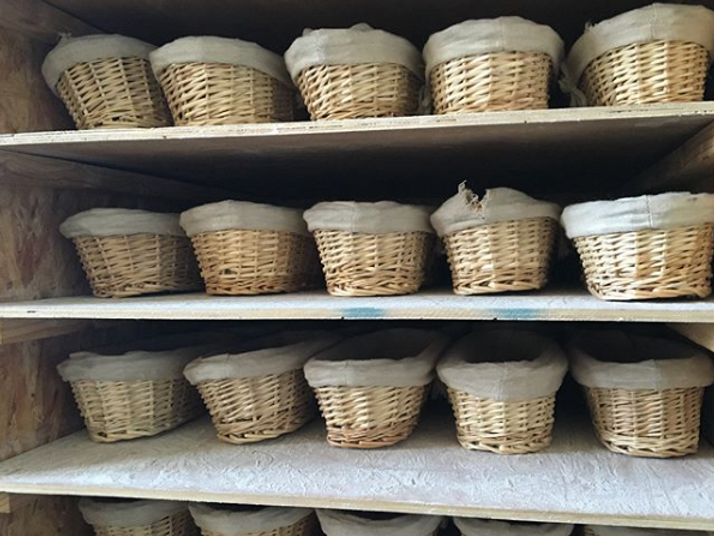More and more self-employed people are choosing to combine growing cereals with baking. To satisfy our appetites, farmer-bakers are taking matters into their own hands, managing everything from field to plate. But how can you be a profitable farmer-baker today? What are the keys? How can you have a clear vision of your business so that you can make the right financial choices?
If you only have a few minutes to read this article, here’s a summary:
- Solution 1: stop working more, work better
- Solution 2: Opt for a concrete strategy for the entire sector without quotas
- Solution 3: Bring flour production in-house so that you have full control over your know-how and your raw materials.
- Draw up your business plan!
What are the challenges facing bakers?
Heavy investment in equipment
To be efficient and to be able to carry out his activity with precision, it is first of all essential to invest in the means of production needed to grow cereals. The farmer-baker will need to acquire a tractor and tillage equipment such as a plough, cultivator and seed drill.
Since this is a heavy financing burden, alternative solutions are increasingly being found. This is particularly true of CUMAs (Cooperatives for the Use of Agricultural Equipment). These companies offer farmers the opportunity to pool the equipment they need to boost their business and improve their results.
The No. 2 investment point for country bakers concerns equipment for the bakery. The kneading trough, oven and small equipment represent a substantial budget for those wishing to set up on their own. Once again, for a while, and it is sometimes possible to hire this equipment, so that it can gradually become self-financing as the business develops.
The 3rd area of investment for a farmer-baker concerns milling. To transform his cereals into flour and thus ensure the quality of the grist he produces and uses to make his bread, biscuits or pasta, he needs to equip himself with a mill (cylinder mill, traditional stone mill or Astrié).
Often, the farmer-baker decides to give his wheat to a miller for processing, so as not to have to invest in a mill, which represents a major item of expenditure. The problem is that he loses control over the quality of the flour produced… A strategic error that can have serious consequences for the development of his business.
Add to that the commercial lease, and the other investments involved in setting up the shop, and you can quickly wonder how you can become a profitable country baker. Don’t panic, solutions are on the way!
Health problems, the health of the baker
The second major problem facing bakers is their health. When they handle poor-quality flour, they suffer from rashes, breathing difficulties and itching. These health problems, which are directly linked to the use of excessively processed white flour, represent a crucial point on which it is essential to take action in order to create a sustainable business. Respecting your health, and that of your customers, is the basis of a strategy that can last this year.

The wrong idea: teaming up with a flour supplier
Often, faced with the high level of investment that awaits them, aspiring bakers get cold feet. So they turn to a solution that seems attractive at first, but quickly becomes a constraint on developing their business: they sign a contract with a miller.
The miller helps the farmer-baker to finance all the initial equipment. In return, he must buy his flour exclusively from the miller.
But there are limits to this idea: it’s impossible for the farmer-baker to control the quality of the flour at his disposal. And yet this is the main point on which bakers need to differentiate themselves.
- Why invest in producing a quality cereal if all the product’s nutritional properties are lost when the seed is turned into flour?
- How can we combat itching and skin and respiratory problems in bakers if they continue to handle over-processed flour?
- And what about the quality of the products offered to the end customer, if the flour is already having an impact on the health of the bakers when the food is being made?
If they are to stand out from the crowd and be truly profitable, this is where bakers need to step in.
How can you become a profitable baker?
To be a profitable farmer-baker, it helps to be able to stand out from the crowd and attract consumers‘ attention. As with any business, you need a differentiation strategy. What do customers gain from buying your products? To sell the bread, pasta, biscuits, pastries and cakes you make, the farmer-baker has to opt for quality.
Solution No. 1 for being a profitable baker: don’t do more, do it better
To be a profitable farmer-baker, the strategy has to be based on quality, not quantity. The quest for a healthy, authentic and ‘tasty’ product is growing fast among the French.
Aware that the food around them had a major impact on their health, they decided to take matters into their own hands.
Nowadays, customers’ food concerns are no longer linked solely to price: with the help of certain smartphone applications that analyse food quality for them, they are regaining control of their plate, and are not giving in: quality or nothing.

If they want to succeed in selling their products, farmer-bakers can no longer be satisfied with being just another producer of traditional white bread. The solution? Opt for rare cereals, older varieties of grain that are easier to digest and more nutritious. Small spelt, large spelt, buckwheat, maize or even chestnuts must find a place in the products you offer for sale.
Growing organic cereals is also an interesting strategy for becoming a profitable farmer-baker in the long term. End customers will be grateful to be able to find a product that does not harm their health and that provides real nutritional qualities (minerals, proteins, vitamins, etc.), making them all the more loyal.

Solution No. 2 for being a profitable baker: opt for an end-to-end strategy
To be able to control every stage in the process of creating the products they sell in their shops, the farmer-baker must become autonomous over the entire production chain:
- Growing cereals
- Processing cereals into flour
- Processing flour into bread, dough, biscuits, pastries, etc.
The solution, then, is to become independent in terms of milling too. The idea is to choose a mill that will enable the farmer-baker to :
- Produce quality flour
- Produce a high enough yield to be profitable

To do this, you need to choose a mill that respects the grain. Generally speaking, traditional stone mills and roller mills do not produce quality flour. Their high rotation speed oxidises the grain, which is then crushed and stripped of its nutritional quality. The result is flour that is difficult to digest and low in fibre, vitamins and minerals, much to the chagrin of future customers…
Solution No. 3 for being a profitable farmer-baker: a quality mill and training in milling
To be able to opt for this strategy from start to finish, you’ll need to choose a low-speed mill, which preserves every nutritional quality of the cereal you’ve taken care to grow.
The Astrié mill, particularly appreciated for the added value it brings to flour, unwinds the grain without crushing it. All the parts of the grain that contain nutrients are preserved, so you can make healthy wholemeal or semi-complete bread with an inimitable taste. Depending on the size of the millstone you choose, you’ll get a higher or lower yield. To find out more, take a look at our article and discover which size of bread wheel to choose for a project that’s just right for you.

Once you’ve chosen your mill, it will be essential for you to learn a new trade: milling. Opt for a company that will support you from A to Z: from the layout plan to the choice of options and training, you’re not on your own to take charge of your mill. To be a profitable farmer-baker, you need to know how to surround yourself with people!
Solution no. 4 for being a profitable baker: draw up a business plan
A farmer-baker starting out in business needs to know where he’s going and how to get there. By learning to calculate his costs and the profitability of his business, he can rationalise his expenditure. As with any business, this step needs to be taken beforehand, and will enable him to know what equipment he can invest in, and what level of output he needs to achieve to make his business profitable.
To be a profitable farmer-baker in 2021, you need to be methodical. You need to draw up a precise and exhaustive business plan, choose equipment that enables you to create top-of-the-range products, and have control over every stage of the transformation process: growing the cereals, turning them into flour, and baking the bread. To intrigue and seduce customers, these keys will help you with your project. And if you need support, our team is here to help!



